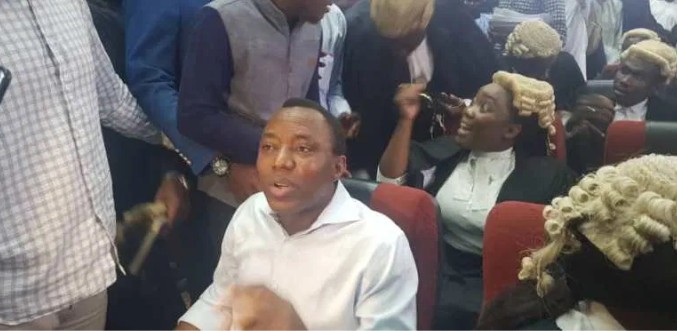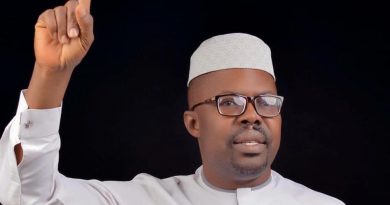RECHECKING THE SPELLINGS OF JUNE 12 By Debo Ikuesewo-Akinbami
The writer was not to vote. He was a frontal watcher of the long lines of senior citizens who dared the sun to be counted for adult suffrage, to do the ballot that civic lessons would call open in later learning. Day was 12th of June, 1993, watershed that would define the magnitude of mess that my country chose by choice.
Heads and hands queued for Chief Moshood Kasimawo Olawale Abiola (MKO), presidential candidate of the Social Democratic Party (SDP), Africa’s tall entrepreneur and about the wealthiest of his time and clime, who many believed and bought his message of hope for a troubled country and who was believed to have won the election he contested with Alhaji Bashir Tofa of the National Republican Convention (NRC). Three decades afterwards, the saga which consumed her sage lives with us with no lasting lesson but a mere ritual of memorabilia that does no substance than offer charlatans a platform for farther pretence.
Hence, we do not intend to drive this piece by the Military theatrics of General Ibrahim Babangida’s regime or the millipede accompaniment of the civilian, not by rhetorics about the ‘freeness or fairness’, not how adjudged or annulled the presidential election was but the stubborn implications it hold for the country that suffers lack of worthy leadership, implications that have persistently bruised a nation’s strife to survive. Let’s check.
Nigeria’s problem did not arrive on the ides of June. 1993 occurrence only represents an implosion of heated treachery, disguised disaffection, hate harbour and mutual distrust that wear ethnic or religious mask and belly a country’s political assemblage. A thorough peruse of Nigeria’s past, from the first indigenous government up to now would reveal a country that seems irretrievably bedevilled by pretentious men and women who failed and yet failing to help the country for which they profess love and loyalty.
Woe began to betide the nationhood moment the founding fathers, who deployed all in their mental and material arsenal to achieve independence disembarked on the lofty goal of building a sturdy nation and resort to provincial pursuits to the hurt of the healthy whole. The poignant words of Godwin Ehiarenkhian Oboh, Nigeria’s sterling communication veteran capture the feeling: “Nigerian Nationalists became conscious of representing the interests of their ethnic nationalities even at the detriment of national interests. This turn of events in the nation’s politics was so dramatic that one could hardly imagine that the same politicians collectively fought for the political independence of the country from the control of British Government.”
The ironies are rife. They live with us. They often push us to the consternation that the same Nigeria whose offsprings fought the white invaders and succeeded cannot heal herself of domestic ailments even after 50 years of self governance. There are soiled seedlings of mutual suspicion and it’s allied which produce ethnic jingoists where genuine nationalists and patriots should be. The seedlings germinate overtime and translate themselves to elements of vices in us. These elements are the true devourers of MKO and his standing.
This is how the thread of seedlings ran through the annals of governance. 1993 political malaise was no opposite of 1964 sweeping electoral fraud that severely hurt the political footing of the country; it replicated, if anything, the hearty hate and rivalry between the North and Eastern folks (in khaki pretence) which birthed the war that consumed millions of defenceless women and children, and widened the gulf. 1993 debacle wears no different garb from Shehu Shagari’s midwifery of 1983 electoral fraud which destroyed the second Republic’s democratic effort. Abiola was another victim of a county’s penchant for perfidy, just as Chief Samuel Ladoke Akintola, Alhaji Ahmadu Bello, Sir Abubakar Tarawa Balewa, Chief Alfred Rewane, Kudirat Abiola and others. The difference was in the space of time.
The devourers are still with us. The elements live in us. They thrives on futile logic of jingoism and putative struggle for superiority which form the paraplegia that eats at the soul of the country. They manifest in various portraits. The elements spur Abiola to declare himself President and Commander – in- Chief on a slippery ground, motivated brethren betrayal and caused General Abacha to rule Nigeria as in jungle.
General Ibrahim Babangida, whose government aborted the 1993 democratic endeavour is an example of the sickly leadership whose weight strains a nation that trudges. Today’s ritual marks the 24th anniversary of the political experiment that the Are Ona Kakanfo of Yoruba land his wealth, worth and even life. What has changed? Nigeria still parades leaders who pay little attention to nationalism, self -seeking leaders who are wont to accumulate crude wealth and watch the masses wallow in unimaginable lack, ethnic rivalry that slackens bond and brotherhood, party politics that lacks definitive ideology, electoral cheats and highly demotivated citizenry.
This memory does not necessarily mean Abiola ‘s travails. It’s a nation’s travails. It’s a fork in the country’s sojourn to difference. Even 24 years after the annulment that shook the country to its foundation, it’s either the compass or the captains are incompetent or both have to be dropped for saner devices. As it’s, the nation is struggling to get its of own spellings correctly, just as the spellings of June 12, 1993 that define today’s date.




